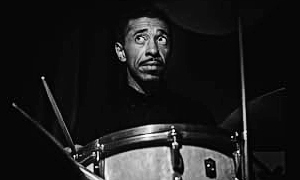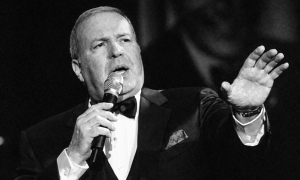Home » Jazz Articles » Book Review » Unapologetic Expression: The Inside Story Of The UK Jazz Explosion
Unapologetic Expression: The Inside Story Of The UK Jazz Explosion
I think for the first time, a lot of musicians are really fearless in representing the cultures they come from, and bringing that into what they create.
—Wayne Francis, United Vibrations/Myriad Forest
 Unapologetic Expression: The Inside Story Of The UK Jazz Explosion
Unapologetic Expression: The Inside Story Of The UK Jazz Explosion André Marmot
424 Pages
ISBN: 978-0-571-37448-9
Faber & Faber
2024
Anyone who has kept half an eye on the UK/London jazz scene since the turn of the century will likely be aware that jazz there has gone from being low- key—in terms of popularity and visibility—to becoming something of a cultural buzzword. Where it was once stigmatized as elitist and dated, and mocked by satirical TV shows, jazz has risen to be hip once more, with its chief flag bearers courted by major labels and international festivals and their music championed by specialist media and broadsheet newspapers alike. How this transformation came about—and the deeper meanings it represents—is at the heart of author André Marmot's stimulating book.
Jazz' new success—and the focus here is really on London—also marks a significant cultural and historical shift according to Marmot. The last time jazz was big news in the UK, in the mid to late-'80s, the stars of the day were predominantly of Caribbean heritage—the children of the Windrush generation. Fast-forward to 2024 and many of the leading figures of this new wave of jazz acolytes are the children of African immigrants whose music reflects both their heritage and their urban environment.
One of the main threads of Marmot's well researched and highly readable narrative is the socio-cultural parallel between this generation of London jazz artists and the historical roots of the music. The forces of imperialism, colonialism and globalization that brought jazz into existence over a century ago, he argues, continue to shape the music's evolution in the UK today, with London at its epicenter. This is a story not just of jazz, but of post-colonial Britain.
It is the story of how musicians like Shabaka Hutchings, Nubya Garcia, Binker Golding, Theon Cross, Zara McFarlane and Moses Boyd, to name just a few, and groups such as Kokoroko, The Comet Is Coming and Ezra Collective, have brought jazz to new and younger audiences by playing music that reflects the(ir) UK, and specifically London, today.
As such, Unapologetic Expression portrays this music—often politically charged —through the multiple lenses of immigration, race and gender, urban development, economic and educational disparities and political disaffection.
But the new wave of London-centric jazz (and related music) is also the result of the liberating DIY ethics nourished by harsh economic necessity, a spirit of entrepreneurship fired by racial prejudice, and the possibilities offered by modern technology. There is a lot to unpack but Marmot is well placed to tell this complex and muti-layered story.
London-born and raised, Marmot is a professional musician, agent, label owner and promoter. As thorough as his historical research evidently is, and as insightful as his personal observations are, the book's essential strength resides in the space he gives to the musicians themselves to tell their own stories. Like an epic opera—and Unapologetic Expression would make for a powerful modern opera—the large cast of revolving interviewees leave telling impressions on almost every page.
Through the voices of Sheila Maurice-Grey, Oscar Jerome, Cassie Kinoshi, Emma-Jean Thackray, Joe Armon-Jones, Camilla George, Yazz Ahmed, Shirley Tetteh and many more, the new UK jazz explosion can be understood in terms of identity politics, ownership, inclusivity, community and mentorship. With regard to the latter, author and interviewees alike pay tribute to the generation that came before and the lessons to be learned from the experiences of the Jazz Warriors—Courtney Pine; Orphy Robinson, Claude Deppa, Cleveland Watkiss, Gary Crosby, Jason Yarde and Steve Williamson—all of whom provide greater context to the rise of the current crop of jazz warriors.
The "explosion" of the title suggests a sudden emergence, the author dating the start of the new London jazz boom—a phrase that will doubtless become dated all too soon—to 2009 and the band United Vibrations. That band, which featured the brothers Ahmad Dayes (trombone), Kareem Dayes (bass) and Yussef Dayes (drums), plus saxophonist Wayne Francis mixed '70s free-jazz, Afrofuturism, West African grooves, grime, drum and bass and London-styled hip- hop. They were, the author states, "way ahead of their time."
If United Vibrations indeed showed what was possible in an ethnically and culturally diverse environment, the London jazz scene that has since emerged has not been shy to follow the example, drawing on multiple musical styles that reference Afrobeat, ska, reggae, dubstep, broken beat and electronica. The musicians interviewed in these pages are unified not just by their eclectic, inclusive influences (where nothing is off limits), but by a pride in their respective identity/ies. "We made jazz sound like London," says Ezra collective's Femi Koleoso.
But as any physicist will tell you, an explosion is conditional upon various agents reacting together. The London jazz scene post-2009 is no different. As the saying goes, it takes a village to raise a child.
To that end Marmot is persuasive in describing the grassroots community culture that has birthed and fed London's new jazz wave. It is a story of trailblazing venues/promoters hosting Black music nights—Luke Newman's STEEZ, Lex Blondin's Church of Sound, and Jazz Re:Freshed, the latter run by hip-hop DJs and promoters Adam Moses and Justin McKenzie. These hosted weekly music nights and jam sessions that were, the author stresses, vital to the scene's growth, particularly in light of the barriers to Black artists playing established venues. A chorus of voices pay tribute to mentoring organizations such as Kinetica Bloco and Janine Irons' and Gary Crosby's long-running talent development program Tomorrow's Warriors, and to all the teachers who have inspired and encouraged individual talent.
The symbiotic relationship between musicians, independent venues, media, autonomous festivals, independent record labels, mentors and DJs/tastemakers—a jazz/Black music ecology—is a major theme of the book. DJ, label owner, promoter and festival curator Gilles Peterson merits a whole chapter, with particular emphasis on the relationship between jazz and dance culture. Peterson's broad church of musical styles, fed by and feeding into jazz, further underlines the fluidity of musical genres in London—round and round, back and forth they go. This circularity of influences comes across as just an extension of the musical trade-offs between America, the Caribbean and Africa that, at various points in history, have informed UK jazz.
Interestingly, not all the protagonists in this book identify unreservedly or exclusively as jazz musicians, their reticence to be labelled, boxed and therefore somehow reduced echoing the attitudes of many leading American musicians as recounted in Radhika Phillips' book Being Here: Conversations On Creating Music (Radio.org, 2013). For many, jazz is just one more language in their toolbox. As Wayne Francis puts it: "I don't think there's necessarily a reclamation of jazz. What there is is a reclaiming of improvised music culture within Black British youth ... I think for the first time, a lot of musicians are really fearless in representing the cultures they come from, and bringing that into what they create."
The author does not go overboard in his praise for the musicians he highlights. Whilst clearly an admirer (this is after all a homage), there is a grounded perspective in his writing that sees this jazz "explosion" as part of an evolutionary process, and the musicians as being on a journey of development and growth.
Whether this current UK/London jazz wave (and the buzz around it) goes from strength to strength in the years to come, or whether it fades from public consciousness like previous surges in jazz' popularity (as many of the older heads warn), Marmot's Unapologetic Expression will no doubt stand as an essential reference to anyone seeking to make sense of the London/UK jazz scene either side of Brexit.
Tags
Book Review
Nubya Garcia
Ian Patterson
United Kingdom
London
shabaka hutchings
Binker Golding
Theon Cross
Zara McFarlane
Moses Boyd
Kokoroko
The Comet Is Coming
Ezra Collective
Sheila Maurice-Grey
Oscar Jerome
Cassie Kinoshi
Emma-Jean Thackery
Joe Armon-Jones
Camilla George
Yazz Ahmed
Shirley Tetteh
Courtney Pine
Orphy Robinson
Claude Deppa
cleveland watkiss
Gary Crosby
Jason Yarde
Steve Williamson
United Vibrations
Ahmad Dayes
Kareem Dayes
Yussef Dayes
Wayne Francis
Femi Koleoso
Kinetica Bloco
Tomorrow's Warriors
Being Here: Conversations On Creating Music
PREVIOUS / NEXT
Support All About Jazz
 All About Jazz has been a pillar of jazz since 1995, championing it as an art form and, more importantly, supporting the musicians who make it. Our enduring commitment has made "AAJ" one of the most culturally important websites of its kind, read by hundreds of thousands of fans, musicians and industry figures every month.
All About Jazz has been a pillar of jazz since 1995, championing it as an art form and, more importantly, supporting the musicians who make it. Our enduring commitment has made "AAJ" one of the most culturally important websites of its kind, read by hundreds of thousands of fans, musicians and industry figures every month.

























